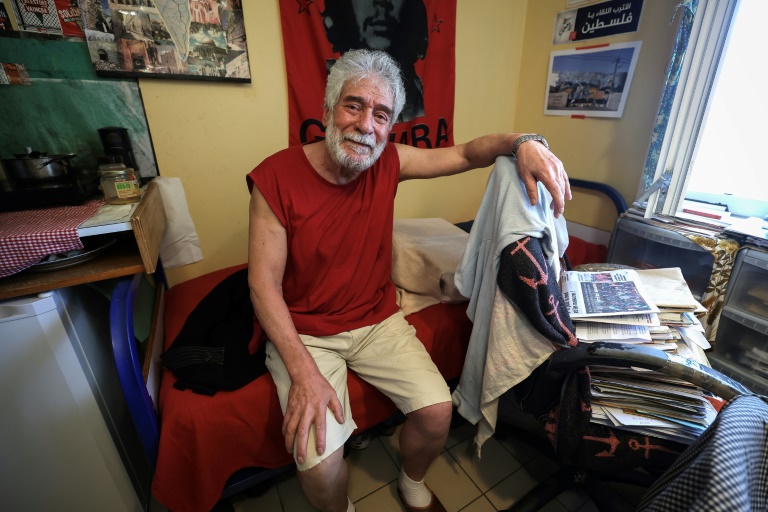Sitting near a poster of Che Guevara inside his French prison cell before his release this week, pro-Palestinian Lebanese militant Georges Ibrahim Abdallah said the “struggle” kept him going during his four decades behind bars.
A court last week ordered the 74-year-old — who was jailed over the 1982 killings of two foreign diplomats in Paris — be released from the Lannemezan prison in southern France on Friday.
Abdallah is one of the longest-serving prisoners in France, where most convicts with life sentences are freed after less than 30 years.
Between his bed, desk and microwave corner, Abdallah had decorated the yellow walls of his 11-square-metre cell with the flag of the Argentine Marxist revolutionary, but also a map of the world and postcards.
An office chair near his bed was piled high with newspapers.
“If I’m alive in front of you today, it’s because I’ve kept up the fight — otherwise 40 years (in jail) would turn your brain to mush,” said the prisoner, whose hair and beard have turned grey.
AFP visited his cell on July 17, along with a hard-left member of parliament, Andree Taurinya, who used her right as a lawmaker to visit detention centres to see him on the day the court ordered his release.
Dressed in a red sleeveless t-shirt and beige shorts, he greeted her warmly and they posed together for a selfie.
Abdallah said that for more than 40 years he had continued to be a “militant with a struggle” — even if it was in very “particular” conditions behind bars.
He said he did not foresee a “radical change in (his) struggle outlook” after leaving France and flying home to Lebanon — the condition for his release.
– Birthday calendar –
Next to his computer, he had pinned up images of flowers, including poppies and cherry blossom, as well as Palestinian flags and a picture of the Al-Aqsa mosque in Jerusalem.
“Forty years is a lot but you don’t feel them go by when you keep up the struggle,” he said.
Many of his fellow militants have died over the years however, he said.
“On my computer I have a calendar to keep track of every day: dead comrades, that’s in brown, orange is for visits, and green is for birthdays,” he explained.
But these days, “the colour brown is taking up more and more space.”
Abdallah was detained in 1984 and sentenced to life in prison in 1987 for his involvement, which he denies, in the murders of US military attache Charles Robert Ray and Israeli diplomat Yacov Barsimantov in Paris.
After his arrest, French police discovered submachine guns and transceiver stations in one of his Paris apartments.
– ‘Pampered’ –
Lebanese of Maronite Christian heritage, Abdallah has always insisted he is a “fighter” who battled for the rights of Palestinians, and not a “criminal”.
Before the decision to release him, he had been eligible for release for 25 years.
But the United States — a civil party to the case — had consistently opposed him leaving prison.
The Israeli embassy in Paris objected to the decision to release Abdallah, saying “such terrorists, enemies of the free world, should spend their life in prison”.
Abdallah, who considers himself to be a “political prisoner”, said he had been “pampered” compared to “what is going on in Gaza and the West Bank, especially for comrades in prison”.
His release comes as Israel wages war against Palestinian militants in the Gaza Strip for a 22nd month, with aid and rights groups warning of mass starvation for civilians trapped in the besieged Palestinian territory.
Deadly Israeli settler attacks on Palestinians in the occupied West Bank have also become commonplace.
Abdallah, who founded a now dissolved Marxist anti-Israel militant group in his youth, endorsed recent protests in the West calling for a Gaza ceasefire.
“Palestine remains the historical lever of the revolution throughout the Arab world,” he said.
elr/ah/jh/rlp

